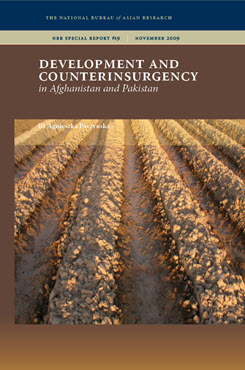NBR Special Report no. 19
Development and Counterinsurgency in Afghanistan and Pakistan
This reoort assesses the prospects and challenges for integrating development strategies into counterinsurgency (COIN) efforts in Afghanistan and Pakistan.
EXECUTIVE SUMMARY
MAIN FINDINGS
- Many of the challenges that confront post-conflict reconstruction processes similarly confound development strategies in COIN efforts, particularly with regard to satisfying the immediate needs of the population, building government capacity, and involving local communities in the development process.
- A successful COIN strategy requires a change in Afghan perceptions of the security situation, the Afghan government, U.S. and NATO/ISAF coalition forces, and the international community.
- Deteriorating security is preventing international organizations and NGOs from accessing many areas in Afghanistan, thereby requiring security forces to distribute aid and run development projects.
- Corruption is one of the greatest obstacles for development programs in Afghanistan because foreign aid is frequently misused and siphoned off for private gain.
- The economic crisis is affecting Pakistan’s political stability, which is already tenuous, at the same time as the Pakistani military is intensifying its fight with militant groups in the tribal areas.
POLICY IMPLICATIONS
- International organizations involved in the design and implementation of development programs must work with the priorities of local communities on a more sustained and regular basis.
- Development strategies must be tailored to the specifics of local needs and circumstances and sensitive to the great variation in geography, economic profile, and security situation among the Afghan provinces and tribal areas of Pakistan.
- Steps must be taken by Afghanistan and the international community to combat corruption that currently weakens development strategies and delegitimizes national and local government.
- The Pakistani military and civilian agencies may face additional challenges to implementing effective development programs as they do not receive the same support and oversight from the U.S. and NATO/ISAF coalition forces.


